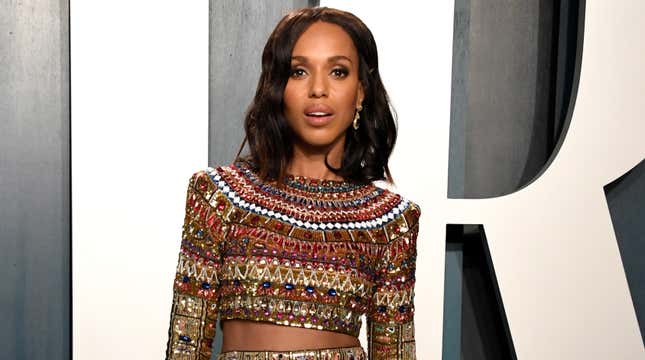
Little Fires Everywhere star Kerry Washington and The Old Guard star Charlize Theron will be facing off in School of Good and Evil, a new feature from Paul Feig, The Root has learned.
Per The Hollywood Reporter, the upcoming film is based on the New York Times bestselling children’s book by Soman Chainani and will see Washington and Theron as Professor Dovey, the Dean of Good, and Lady Lesso, the Dean of the School for Evil, respectively. The story follows “best friends Sophie and Agatha, students at the titular School for Good and Evil, where ordinary boys and girls are trained to be fairy-tale heroes and villains. With her princess ambitions, Sophie knows she’ll be picked for the School for Good and join the ranks of past students like Cinderella and Snow White. Meanwhile, Agatha, with her grim aesthetic and wicked cat, seems a natural fit for the villains in the School for Evil. But when the girls find their fortunes reversed, with Sophie dropped into the School for Evil and Agatha into the School for Good, their friendship will be put to the test.”
“Good always prevails over evil…did you miss the memo?” Washington playfully tweeted to Theron once the news surfaced. “Oh, it’s on,” Theron tweeted out, tagging Kerry Washington. “Where all my witches at?”
Feig has been tapped to produce the film along with Jane Startz, Jeffrey Kirschenbaum, Joe Roth, and Laura Fischer. Chainani, Zack Roth, and Patricia Riggen are also set to executive produce with David Magee and Laura Solon on board to write the script. Washington recently sat down with SAG Award-winning actress and activist Laverne Cox for Variety, where they discussed being the “only” in a room for much of their Hollywood careers and the ongoing struggle and demand for representation in front of and behind the camera. Referring to her time as a producer for Hulu’s Little Fires Everywhere, Washington explained, in part:
“When you’re the “only” on set whether it’s the only woman, the only Black person, the only Black woman, the only trans woman, you have all of this additional weight and responsibility to be speaking for your race, speaking for your people, speaking for your community, as opposed to being like an artist who also has the shared experience of belonging to that community. So to create an environment where our writers can be artists first and where we could have a multiplicity of perspectives of what it means to be a Black mama so that we could get to the reality of what this character is experience was, was really powerful and I felt it.”
She added, “There were moments where, I would watch a particular edit and feel like ‘Oh man, I think the feedback I need to give right now, I need to give it to a Black person, because I need to bounce this off my sister first that I’m sure we’re on the same page when we come back explaining why we need to see more side eye in that scene.’ We’re able to say it in the right way and have people understand the dynamics of what’s happening for this Black woman in this moment. It’s really powerful creating opportunities where people feel safe to bring their perspectives to the table and don’t have to carry the weight of being the ‘only’ while they do that.”

